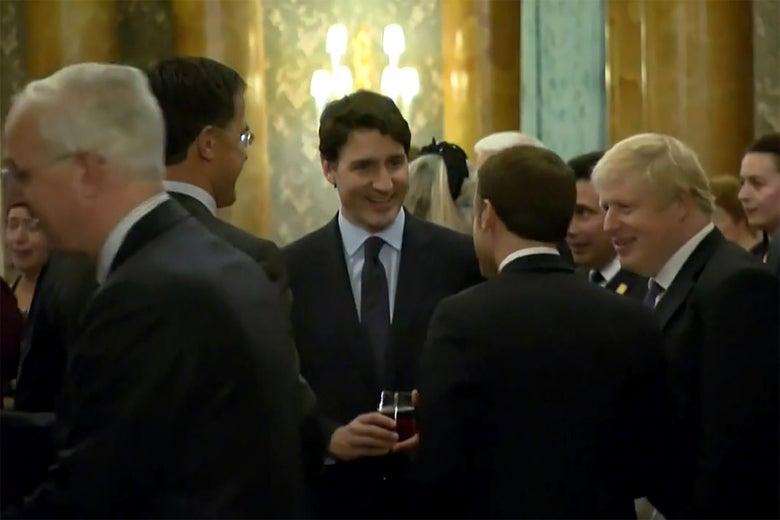
This grab made from a video shows Dutch Prime Minister Mark Rutte, French President Emmanuel Macron, British Prime Minister Boris Johnson and Canada’s Prime Minister Justin Trudeau at a Buckingham Palace reception on December 3, 2019 in London.
-/Getty Images
On the scale of Donald Trump’s sins, the length of his press conferences is pretty minor. But in a now-viral video of an informal huddle of world leaders, Canadian Prime Minister Justin Trudeau marveled that Trump “was late because he takes a 40-minute press conference off the top” at this week’s NATO summit and said “You just watched his team’s jaws drop to the floor”—apparently in reference to his surprise announcement that next year’s G7 summit at Camp David. The video prompted Trump to call Trudeau “two-faced” and leave the gathering early in a huff. This is not the first time Trump has flown off the handle at some mildly spicy remarks from Trudeau at a global summit.
This time, the prime minister’s comments were picked up during an informal chat with French President Emmanuel Macron, British Prime Minister Boris Johnson, British Prime Minister Mark Rutte, and the UK’s Princess Anne. (The presence of Johnson, Trump’s friend and ally, in this huddle, and that fact that he seems to be laughing along, might be the biggest source of annoyance for Trump.)
The reason the video caused such a stir was not because of what was actually said—Trump’s heard worse. It’s rare for us to hear what leaders of U.S. allies honestly think about Trump. Given his behavior over the past three years, it’s not exactly shocking that they’re fed up and baffled by him, but they never say so publicly, leaving reporters to draw conclusions from body language.
Trump has gotten away with a lot of his shabby treatment of allies because their governments can’t afford to push back. Think about former Prime Minister Theresa May repeatedly trying to stay on Trump’s good side in hopes of a post-Brexit trade deal, despite him publicly trashing her performance in office; or President Muhammadu Buhari giving Trump cover after he described Buhari’s Nigeria as a “shithole” country. If you’re the leader of Iran or North Korea, you can trash Trump to your heart’s content. If you’re reliant on U.S. aid, trade, or military support, you just have to grin and bear it.
This dynamic has continued through Trump’s most recent foreign policy blunders. The Syrian Kurds who threw rocks and rotting food at departing U.S. troops in October were probably an accurate representation of the Kurdish public reaction to Trump’s decision to greenlight a brutal Turkish military offensive into Northern Syria. Syrian Kurdish commanders, by contrast, refrained from criticizing the initial decision, and effusively praised Trump after the U.S. helped reach a ceasefire deal that cemented Turkish control over much of what had been Kurdish territory:
As unreliable an ally as Trump has been, it’s still to the Syrian Kurds’ advantage to maintain whatever level of U.S. support they can. And sure enough, the U.S. troop withdrawal from Syria turned out not to be as complete as initially advertised. This might have gone differently if Kurdish leaders had been loudly accusing Trump of betrayal.
Or take Ukrainian President Volodymyr Zelensky who, in the face of abundant evidence, has continued to maintain that he felt no pressure to investigate Joe Biden’s son in exchange for military aid. During Congressional impeachment hearings, Republicans used Zelensky’s silence as evidence that there was no pressure, but Zelensky is not really in a position to say otherwise. Trump finally agreed to release Ukraine’s military aid—after, it turns out, he learned about the whistleblower complaint about his dealings with Zelensky—but who’s to say he won’t change his mind again? Zelensky can’t afford to be seen by the White House as affiliated with the impeachment effort.
The leaders in the huddle at NATO have more leverage than Ukraine or the Kurds. And after early attempts at flattery failed to win Trump over, Macron has been getting a little more publicly critical—but NATO countries still want to do what they can to keep Trump in the alliance, and the UK and Canada want to preserve whatever good will they can for trade talks. There’s a reason the exasperation was expressed in a side conversation at a cocktail party rather than a press conference.
Part of this dynamic is just the advantage of being the leader of a superpower. China also gets deferential treatment from smaller countries. Part of it is the awareness of foreign governments that Trump can rapidly shift policy on a whim, and often conflates his personal interests with his country’s. Flattering Trump doesn’t always work, but there’s certainly no advantage to irritating him.
All of this is very frustrating to Democrats trying to frame a sustained critique of Trump’s foreign policy. Most of the presidential candidates have criticized him for alienating U.S. allies, and that’s a fair attack. The problem is that those allies know he might still be president after 2020 so they can’t afford to help the Democrats make this case.
Democratic candidates are already jumping on the NATO incident as evidence of the danger of letting Trump run the country’s foreign policy. Trudeau’s statement was fairly mild, despite Trump’s reaction, but it may be the best they’re going to get.
Readers like you make our work possible. Help us continue to provide the reporting, commentary and criticism you won’t find anywhere else.
Join Slate Plusfrom Slate Magazine https://ift.tt/2Pg9Ihw
via IFTTT
沒有留言:
張貼留言